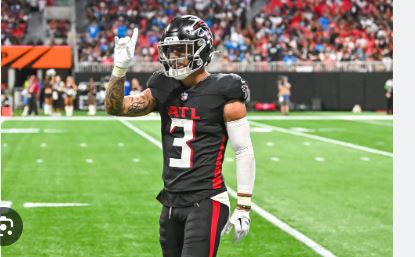
After finally emerging from beneath the mountain of dead cap left by the previous regime, the Falcons awarded several lucrative contracts this offseason.
The team not only rewarded its own with new contracts, but they also went out and participated in free agency with no financial constraints.
Chris Lindstrom, who signed a record-breaking contract, received the largest of the deals. Following an All-Pro season, the former first-round pick signed the richest deal in NFL history for a guard — five years and $105 million. It broke several records, including AAV, guarantees, and total money.
It was quickly surpassed in some ways when the Cowboys extended Zack Martin’s contract by $36 million over two years. Martin was set to make about $7 million less than Nelson and Lindstrom prior to the new deal after signing a seven-year, $93.41 million contract in 2018.
The Falcons also gave Jessie Bates, the free agent class’s crown jewel, a $64 million contract. He is paid $36 million over the first two seasons and $28 million over the last two. Though no safety will outperform Bates’ contract this offseason, it is being used as a benchmark for free agents.
“A top safety in March will likely cost $16 million per year on a new contract, with an average of $18 million per year over the first two seasons,” according to ESPN. That’s basically what Atlanta gave Jessie Bates III in March ($64 million over four years, $36 million over 2023-24). “– Fowler”
Many Falcons fans have expressed their dissatisfaction with Arthur Smith and the club’s underwhelming first half of the season. Rightfully so, given Arthur Blank’s investment in this roster.
The top-end talent and depth were significantly improved, in some cases dramatically, but the team is in the same position after ten games as the previous two seasons. Smith deserves the majority of the blame; he’s the head coach, and it comes with the job.
What hasn’t gotten as much attention is Terry Fontenot’s role in all of this. He can’t call down to the field and tell Arthur Smith to run the ball, as Leigh Anne Tuohy did to Coach Cotton. However, his fault lies in the roster’s construction, which includes the quarterback position and its lack of direction.
/cdn.vox-cdn.com/uploads/chorus_image/image/70507560/1344629097.0.jpg)
Arthur Smith, I’m sure, had some say in Matt Ryan, Marcus Mariota, Desmond Ridder, and Taylor Heinicke’s time in Atlanta. The question is how much influence each had in bringing those guys in. I’m guessing it was a collaborative effort, with Smith telling Fontenot what he needed/wanted and the general manager doing what he thought was best given the circumstances.
Though it is a significant factor in evaluating Fontenot, the roster has many other aspects. The current and future looks are important, as are the salary cap and draft arsenal. He’s certainly struggled in the draft, performed admirably in free agency, and has the club’s finances in relatively good shape.
If I were the teacher, I’d give him a C-, and Pro Football Focus’ Brad Spielberger ranked him in the “Questionable process, varying results” tier of his GM rankings, which primarily focused on the following categories:
In comparison to expectations, draft pick production
Consideration of positional value
Estimated trade value
Free-agent signing value versus expectation
Extension granted early
Five general managers were in the first tier, 11 in the second, and Fontenot was one of nine in the third. Seven were too new to be classified. I don’t believe Spielberger’s assessment is unfair or inaccurate; in fact, I believe it is fairly accurate.
Making Chris Lindstrom the highest-paid guard in the league was the Falcons’ only option, but building around a guard hasn’t always resulted in a consistent winner. Three consecutive top-10 picks on tight ends, wide receivers, and running backs is obviously not the formula.
The Falcons lack promising prospects at two of the most important positions in the game: quarterback and edge rusher. Until Arthur Smith and Terry Fontenot figure out which, they’ll always be thought to be

Leave a Reply